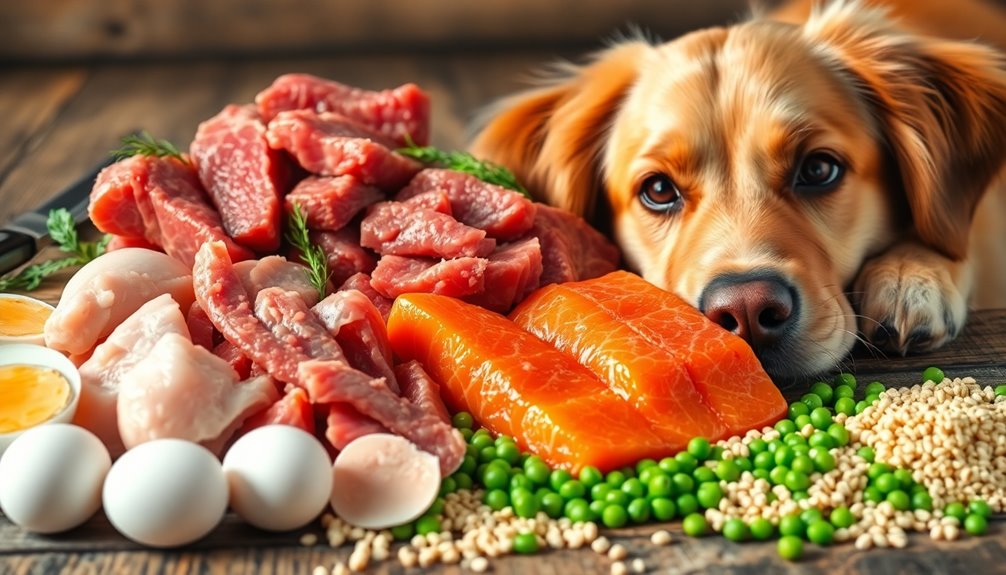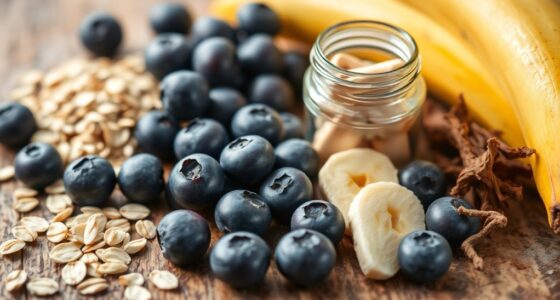To keep your dog in peak health, focus on five essential nutrients: protein, fat, vitamins, minerals, and carbohydrates. Protein forms the building blocks for muscles and tissues, while fat provides crucial energy and supports skin health. Vitamins boost metabolic health and immune function, and minerals strengthen bones and aid many bodily functions. Finally, carbohydrates serve as a primary energy source, especially for active dogs. To guarantee your furry friend thrives, balance these nutrients properly in their diet. There's much more to discover about each nutrient and how they work together for your dog's well-being.
Key Takeaways
- Protein is essential for growth and tissue repair; prioritize high-quality sources like lean meats and eggs.
- Fat provides energy and supports skin health; include healthy fats like fish oil and olive oil in the diet.
- Vitamins are crucial for metabolic health; ensure a balance of fat-soluble and water-soluble vitamins through diverse food sources.
- Minerals support bone strength and bodily functions; focus on both macrominerals and microminerals to prevent deficiencies.
- Carbohydrates serve as an energy source; choose whole food sources to fuel daily activities and maintain healthy digestion.
Protein – The Essential Building Block

When it comes to your dog's diet, protein serves as the essential building block for their health. It's critical for the growth, repair, and maintenance of tissues, including muscles, skin, and organs. Healthy dogs require a minimum dietary protein requirement of 18% dry matter (DM), while puppies and lactating mothers need around 22% DM to support their higher growth needs.
You should focus on high-quality protein sources like lean meats, fish, eggs, and organ meats, as these provide essential amino acids that dogs can't synthesize on their own. This dietary intake is essential for their overall well-being.
Remember, the Biological Value (BV) of a protein indicates its quality; higher BV proteins are more efficiently converted into body proteins.
Balancing protein consumption is necessary—too little can affect health, while excessive protein (over 30% DM) may lead to health issues. Consequently, aim for a diet that meets your dog's protein needs without going overboard.
Fat – The Ultimate Energy Source

Fat is a powerhouse in your dog's diet, providing the highest caloric value among macronutrients. It offers up to 2.25 times the energy of proteins and carbohydrates, making it indispensable for active dogs. Including healthy fats guarantees your pup has the energy they need for daily activities and playtime.
Essential fatty acids (EFAs), like omega-3 and omega-6, are derived from dietary fats and play a significant role in dog nutrition. These fatty acids help maintain healthy skin and a shiny coat while supporting overall cellular function. Without sufficient fat, your dog might suffer from dull coats, poor wound healing, and increased susceptibility to infections.
Moreover, fats are crucial for the absorption of fat-soluble vitamins A and D, which are necessary for various metabolic processes. Healthy sources of fat include animal fats, fish oil, and vegetable oils like olive and sunflower oil.
Vitamins – Key to Metabolic Health

Vitamins play an essential role in your dog's metabolic health, fueling everything from energy production to immune function. These organic compounds are critical for various metabolic processes, including DNA synthesis and bone development. Your dog needs both fat-soluble vitamins, like vitamin A and vitamin D, and water-soluble vitamins, such as the B-complex and vitamin C, to thrive.
Vitamin A is fundamental for maintaining vision, coat health, and supporting the immune system, while vitamin D helps with calcium and phosphorus absorption, guaranteeing strong bones. Without these essential nutrients, your dog could face deficiencies that may lead to serious health issues.
It's important to remember that excessive intake of vitamins can cause toxicity. That's why balanced diets, meeting AAFCO guidelines, are crucial for your dog's overall health.
Incorporating organ meats and leafy greens into their meals can provide an excellent source of these essential vitamins, helping to maintain ideal metabolic health. By focusing on a nutritious diet, you can make certain your dog receives the vitamins they need to support their metabolic processes and overall well-being.
Minerals – Essential for Bodily Functions

Minerals play an essential role in keeping your dog healthy, supporting everything from oxygen transport to bone strength. These inorganic compounds are divided into macrominerals and microminerals, each with unique functions.
Macrominerals, like calcium and phosphorus, are required in larger amounts and are significant for bone building and energy metabolism. Adequate calcium helps maintain bone integrity, while phosphorus plays a key role in cellular functions.
On the other hand, microminerals such as iron, zinc, and copper are needed in smaller quantities but are critical for enzyme functions and supporting your dog's immune system. Deficiencies in these minerals can lead to serious health issues; for example, a lack of calcium can result in bone disorders, and insufficient iron may cause anemia.
Monitoring your dog's mineral intake is important for preventing both deficiencies and excesses, which can lead to adverse health effects.
Ensuring a balanced diet rich in essential minerals will help your dog thrive, maintain a strong immune system, and support overall bodily functions. Keeping an eye on these nutrients is key to providing your furry friend with the best possible health.
Carbohydrates – Energy Source for Dogs

Carbohydrates are an essential energy source for your dog, fueling their daily activities and keeping them active and lively. They provide glucose, which is critical for maintaining energy levels during play and exercise.
While dogs don't require carbohydrates in the same way they need proteins or fats, incorporating healthy carbohydrates from whole foods like grains, fruits, and vegetables can enhance their overall dietary health.
For growing dogs and those with high energy needs, aim for at least 20% carbohydrates in their diet to meet their energy demands. However, it's important to monitor carbohydrate intake, as excessive carbohydrate consumption can lead to health issues. Balancing nutrients is key to ensuring your dog thrives.
Additionally, dietary fiber, a type of carbohydrate, plays a significant role in normal gastrointestinal function. It aids in digestion and nutrient absorption, promoting a healthy gut.
Frequently Asked Questions
What Are the Most Important Nutrients for Dogs?
When you think about your dog's nutrition, focus on proteins, fats, vitamins, minerals, and carbohydrates.
Proteins build and maintain tissues, while fats provide concentrated energy and help absorb essential vitamins.
Vitamins support various metabolic functions, and minerals are vital for bone health and muscle function.
Even though carbohydrates aren't essential, they can offer a good energy source.
Balancing these nutrients guarantees your dog stays healthy and vibrant in their daily life.
What Are the Top 5 Healthiest Dog Food?
You'd think picking the healthiest dog food would be a walk in the park, right?
But with so many options, it's a challenge!
For top choices, consider Orijen Original for high protein, Blue Buffalo Life Protection for balanced nutrition, Wellness CORE Grain-Free for protein lovers, Hill's Science Diet for tailored health, and Canidae PURE for simplicity and sensitivity.
Each one packs a punch of nutrition, keeping your furry friend happy and healthy!
What Are the 7 Vitamins Your Dog Needs for a Healthy Life?
Your dog needs several essential vitamins for a healthy life.
Start with vitamin A for vision and immune support, followed by vitamin D for strong bones.
Don't forget vitamin E, which acts as an antioxidant, and vitamin K for proper blood clotting.
Water-soluble B-complex vitamins play an important role in energy metabolism and nerve function.
Finally, guarantee your pup gets enough vitamin C for overall health.
Balancing these vitamins is key to your dog's well-being.
What Is the Number One Meat You Should Never Feed Your Dog?
When it comes to your pup's diet, you should steer clear of raw or undercooked chicken.
It's a recipe for disaster, harboring harmful bacteria like Salmonella and Campylobacter that can make both you and your dog sick.
Plus, raw chicken bones can splinter, causing serious injuries.
If you want to treat your furry friend, always stick to cooked, boneless, and skinless chicken to keep them healthy and happy.
Conclusion
By ensuring your dog gets these top five nutrients, you're not just feeding them; you're fueling their adventures. Envision this: a sunny day at the park, your pup bounding with energy, tail wagging, and eyes sparkling. That liveliness comes from a balanced diet rich in protein, fat, vitamins, minerals, and carbohydrates. So, as you fill their bowl, remember that each bite plays an essential role in their happiness and health, making every moment together even more special.









